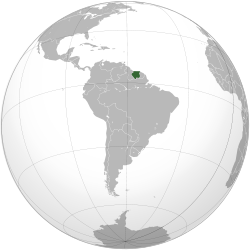Dutch Surinam
| Kolonie Suriname | ||||||||
| Dutch colony | ||||||||
|
||||||||
|
|
||||||||
|
Suriname in 1954
|
||||||||
| Capital | Fort Zeelandia | |||||||
| Languages | Dutch | |||||||
| Religion | Dutch Reformed | |||||||
| Political structure | Colony | |||||||
| Governor | ||||||||
| • | 1668–1669 | Abraham Crijnssen | ||||||
| • | 1683–1688 | Cornelis van Aerssen van Sommelsdijck | ||||||
| • | 1689–1696 | Johan van Scharphuizen | ||||||
| • | 1827–1828 | Johannes van den Bosch | ||||||
| • | 1902–1905 | Cornelis Lely | ||||||
| History | ||||||||
| • | Capture of Surinam | 26 February 1667 | ||||||
| • | Proclamation of the Charter for the Kingdom of the Netherlands | 15 December 1954 | ||||||
|
||||||||
Surinam was a Dutch plantation colony in the Guianas, neighboured by the equally Dutch colony of Berbice to the west, and the French colony of Cayenne to the east. Surinam was a Dutch colony from 26 February 1667, when Dutch forces captured Francis Willoughby's English colony during the Second Anglo-Dutch War, until 15 December 1954, when Suriname became a constituent country of the Kingdom of the Netherlands. The status quo of Dutch sovereignty over Surinam, and English sovereignty over New Netherland, which it had conquered in 1664, was kept in the Treaty of Breda of 31 July 1667, and again confirmed in the Treaty of Westminster of 1674.
After the other Dutch colonies in the Guianas, i.e., Berbice, Essequibo, Demerara, and Pomeroon, were lost to the British in 1814, the remaining colony of Surinam was often referred to as Dutch Guiana, especially after 1831, when the British merged Berbice, Essequibo, and Demerara into British Guiana. As the term Dutch Guiana was used in the 17th and 18th to refer to all Dutch colonies in the Guianas, this use of the term can be confusing (see below).
The colonization of Surinam is marked by slavery. Plantations relied on slave labour, mostly supplied by the Dutch West India Company from its trading posts in West Africa, to produce their crops. Sugar, cotton, and indigo were the main goods exported from the colony to the Netherlands until the early 18th century, when coffee became the single most important export product of Surinam. The crash of 1773 dealt a severe blow to the plantation economy, which was further exacerbated by the British abolition of slave trade in 1807. This abolition was taken over by the William I of the Netherlands, who signed a royal decree in this regard in June 1814, and who concluded the Anglo-Dutch Slave Trade Treaty in May 1818. Many plantations went bankrupt as a consequence of the abolition of slave trade. Without supply of slaves, many plantations were merged to increase efficiency.
...
Wikipedia



